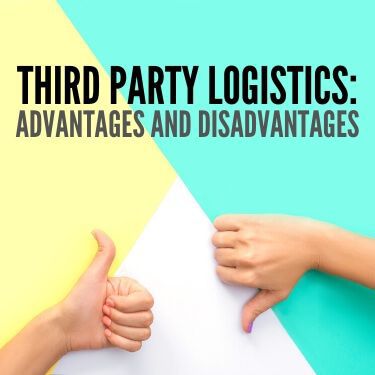
 Copy URL to Clipboard
Copy URL to Clipboard
Shipping and logistics operations are an essential part of any business. But when a company gets bigger, the complexity and scope of these important supply chain steps can become overwhelming. A business should consider whether it’s best to start outsourcing its logistics and hire a 3PL company. First off, it’s important to assess the advantages and disadvantages of third-party logistics.
Third-party logistics (3PL) companies can help your business in a multitude of ways, but there are trade-offs to consider. Weighing the third party logistics advantages and disadvantages will help you decide the best way to grow your business.
Table of Contents
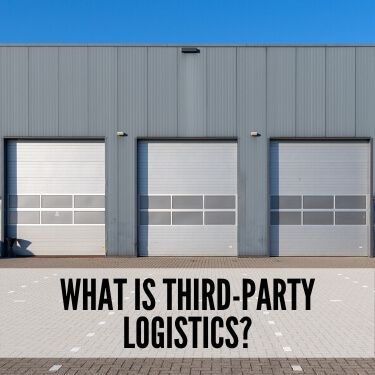
As you evaluate whether to enlist a third party logistics company to handle your logistics functions, first make sure you understand what 3PL services entail.
You might think of logistics in the general sense of coordinating a complex process. But when it comes to businesses that sell products or require raw materials, logistics refers more specifically to the movement of items along a supply chain. Logistics services include:
Some companies coordinate their own logistics in-house. Third-party logistics, or 3PL, is when a business instead outsources these responsibilities to another company that specializes in shipping, fulfillment, storage and other aspects of supply chain management. You might also see 3PL referred to as outsourced logistics.
More and more major companies are opting to outsource their logistics services. A survey released in 2017 found that 90 percent of Fortune 500 companies in the United States make use of at least one third party logistics company, according to Logistics Management. Compare that figure to just 46 percent in 2001.
The global third-party logistics market now stands at around $700 billion. In the United States alone, the 3PL market’s gross revenue increased nearly 16 percent last year to over $213 billion, according to Transport Topics.
Top companies, it’s clear, have evaluated the advantages and disadvantages of 3PL solutions and come out emphatically in favor of them. Working with a 3PL can make aspects of your business more efficient and cost effective. However, in-house logistical services have benefits of their own for certain companies. Let’s run through the pros and cons of third party logistics to help you make the right choice for your business.
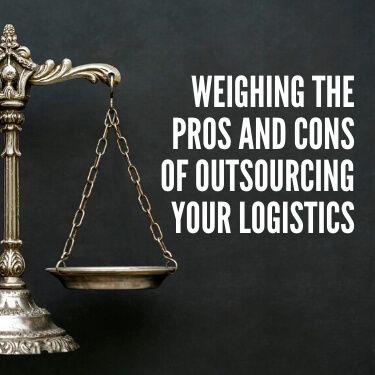
Now that you understand what a 3PL company offers, you need to carefully review the advantages and disadvantages of outsourcing your logistics and shipping services.
A third-party logistics provider can improve your business in ways you might not realize at first. On the other hand, any adjustment to your operations deserves serious consideration. The change will have ripple effects to other areas of your business.
There are many reasons why a company should look into outside fulfillment and distribution services. You should consider tapping a 3PL company for your logistics needs when your business is growing in a way that makes it difficult to keep up with these services internally. You may also want to focus your business more narrowly on your core competencies.
Factors to consider in making the decision to switch to a 3PL provider include costs, efficiency, scale, flexibility, level of control, customer service and much more. Smaller businesses and larger ones will prioritize different elements. There’s no one right answer to this question -- rather, it’s about finding out what’s the best logistical solution for your business.
Let’s start with the positives of third party logistics. There are many clear benefits that an outsider operator can bring to your business. They break down into a few broad advantages -- a 3PL can help your business achieve the following:
With those ideas in mind, we can dig more deeply into each of the ways that a 3PL provider can help your company grow.
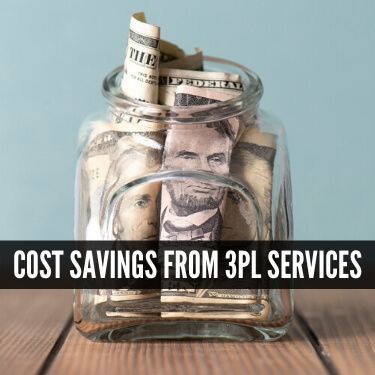
Third party logistics services might seem expensive at first glance. If you already have your own fulfillment and distribution processes in place, you might be surprised by the upfront costs that 3PL providers require.
The best 3PL companies, however, justify those costs by maximizing value -- because of the logistical infrastructure they have in place, you can get more out of your dollar. This can save you money in the long run by cutting out inefficient processes.
The top third party logistics providers will have global networks with routes that span the country and warehouses in prime locations. These offerings allow them to consolidate storage and shipments, saving money for their clients. The most efficient operations will lead to cost savings for client and provider alike.
Your 3PL provider should also be well equipped to handle any surprises or hurdles that they encounter during the process of moving products, materials or other items along a supply chain. Since logistics is their core business, they know the ins and outs of solving problems on the fly. For their clients, this means cutting down on unforeseen expenses. Meanwhile, in-house logistics requires your own company to devote your own energy and resources to countering any issues.
In the competitive logistics field, 3PL providers survive by keeping up with the most advanced technology for inventory management, shipment tracking, automation and more. Innovators are always coming up with breakthroughs that make processes more efficient and customer-friendly.
To stay current, the easiest way is to enlist a 3PL company that makes it their business to keep moving forward. If you’re handling logistics operations in-house, it falls to you and your team to stay up to date on these ever-changing systems.
The range of new technologies relevant to the logistics operations span every step in the supply chain. You may be surprised by the variety of new platforms, tools, machines, and software that 3PL providers use to remain competitive. A few examples include:

If you’re not in the business of shipping and logistics, your business is likely stepping out of its comfort zone when it takes on the responsibilities of shipping, fulfillment, distribution and other supply chain operations.
For 3PL providers, meanwhile, these processes are their entire focus. Their operations are built around providing efficient transportation and well-managed storage for their clients’ items. The best third party logistics companies have the experience necessary to get the job done, and a deep understanding of the hurdles that you’ll encounter in moving products or materials.
Rather than force yourself to answer all of your logistics and supply chain questions in-house, take advantage of the years of experience developed by companies that have made logistics their core focus.
When you run into problems or issues with your supply chain operations, using a 3PL provider is like having a logistics doctor on call. The best companies will be available to help out with whatever situation is holding you up -- even if it’s a new and unexpected problem for you, experienced logistics professionals will be unfazed.
Shipping and logistics isn’t just about figuring out the best way to carry something from point A to point B. It also means contending with the myriad rules that restrict and regulate their movement along highways and across borders.
Companies that are transporting items have to deal with no small number of government regulations. It takes an expert to know how to navigate these rules without a hitch. While you might have a good handle on the shipping requirements for your items, businesses looking to expand their scope of products or forge into new markets will run into brand new regulations to grapple with.
Save yourself the trouble of brushing up on these rules by outsourcing the task. A 3PL provider will have a comfort level navigating the various restrictions and requirements from different government agencies in every step in the supply chain. It’s their business to know how to sift through the labeling, customs bonds requirements, and other standards expected on shipments.
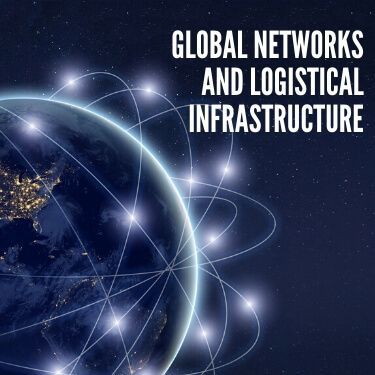
A major advantage of enlisting a 3PL company is making use of the logistical infrastructure that these providers already have in place. A major 3PL will have a vast network of interconnected routes that allow them to maximize efficiency while shipping different clients items across the country and beyond. They will also have access to warehouses and distribution facilities in prime locations to make for convenient fulfillment and distribution.
When you hire a 3PL provider, they will be able to leverage this network to find the most cost effective ways of moving your products or materials along the supply chain. If any challenges or hurdles arise, they already have a firm understanding of alternative routes and solutions to satisfy your needs.
In-house logistics, meanwhile, would have to counter these issues on the fly, without the pre-existing infrastructure.
One of the main reasons that companies look to outside help for their logistics services is to help their business grow. The logistical infrastructure a 3PL provider offers will let a company scale the footprint of its fulfillment and distribution with ease.
Rather than dedicating your company’s time and resourcing to setting up your own distribution channels, locating and securing new warehouses and storage facilities, and hiring and training new workers to handle the influx of new shipments, it’s simpler to hire a company that has all of these things already in place.
Hopefully, your growth will continue -- and your 3PL will continue to make use of its network to keep up with your new shipments and clients. And if all goes right, you’ll see the effect of economies of scales: Costs per unit going down as volume increases.
A new small business might have been satisfied handling these services themselves, but if the business is succeeding, eventually your volume could very well outpace your ability to effectively manage it.
A third party logistics company will be able to optimize your inventory and routing management with advanced systems developed through years of learning what works best for clients. Their expertise and consolidation can be used to find previously unavailable efficiencies that make these critical processes work better for you and your customers.
Consolidating your shipment items with those of the 3PL provider’s other clients benefits everyone. The 3PL company can coordinate where each item needs to end up and when that should happen, bundling products and materials with similar timelines and destinations. Because the clients now don’t need to coordinate an entire route for only their own items, the cost is shared among them.
The principle is the same when it comes to warehousing. By consolidating an array of inventory from different clients that all require the same storage conditions and location, they can lower storage costs for everyone.
It’s true that, unless you wield tremendous influence, third-party logistics can’t be as specifically catered to your business as in-house logistics. After all, a 3PL provider has to set up their business and operations to satisfy as many clients as possible. They can’t overhaul their systems to meet the needs of a single customer.
However, you might be surprised by how much a 3PL provider can individualize its services to accomplish what a client requires. The top third party logistics companies can call upon their connections and networks to devise customized logistics services that can meet your standards, desired conditions, and efficiency. While relinquishing some control is necessary, the best 3PL operators will make a point to make the process as seamless as possible.
One of the major advantages of 3PL companies is the wide variety of ways they can improve your company’s supply chain processes. While you might approach a 3PL provider with specific needs in mind, you should ask about the other services that the company offers. You might not realize the breadth of ways that a 3PL can add value to your operations.
It’s important to learn about all of the possible logistics services relevant to your business model that can expand your reach, improve your processes and make your shipping. Here are just a few 3PL offerings to consider.

Using a 3PL partner doesn’t just mean your logistics dollar goes farther. It means that you have more time and energy for your team to focus on your core business. Put simply, logistics is complicated. Doing it right means coordinating a series of complex, overlapping processes and a wide range of workers. To satisfy your customers, these operations have to run without a hitch.
If logistics is not your main business model, tasking yourself with those responsibilities can be a drain on valuable resources that could be put toward your core objectives. Shift the burden to a company that specializes in these services.
Some of the benefits of enlisting a logistics partners are less concrete and less immediate than others. But when weighing the pros and cons of 3PL providers, it’s important to remember that any new business partnership can pay dividends down the line. Forming a relationship with a respected, competent 3PL company and its representatives can help build your rolodex.
It nevers hurts to make connections in the competitive business world that could open up new opportunities down the line. A long term partnership can lead to innovative, mutually beneficial ideas for your business. Meanwhile, keeping logistics in-house leads to an insular process and could halt differing perspectives.
After that long list of benefits to 3PL companies, you might think this decision is a no-brainer. And it’s true that there’s a strong case to be made for outsourcing your logistics operations. But before you commit to a 3PL provider, it’s important to consider the possible downsides.
Third party logistics isn’t the right call for every single business -- if these drawbacks would be a major impediment to your company’s success, it might be best to keep things in-house.
The most obvious and frequently cited disadvantage of third party logistics is the loss of complete control over your supply chain operation. When these services are handled internally, a company’s decision-makers have the final say in all matters, and can customize their routes, strategies, systems, and technology to the particular needs of the business.
With 3PL providers, you are limited by what an outside company can offer. Even if the 3PL company has everything you need today, as your business grows and changes they might not be equipped to take on new demands that you have. You never want to feel like your business’s potential is being constrained by a business partner.
As previously mentioned, a 3PL’s wide networks of routes and warehouses make it likely that they can satisfy the needs of most companies. But if you have very specific requirements that you can’t budge on, internal logistics might be the way to go.
We’ve covered how entrusting your logistics to an outside company that handles a variety of shipments can lead to more efficient processes and, as a result, cost savings. But make no mistakes: Enlisting an expert 3PL company to take on your logistics operations is not cheap.
Getting started as a new client of a 3PL provider can involve substantial upfront costs to launch the services. If you already have in-house logistics operations running, making the switch will inevitably lead to new short-term costs. Hiring a 3PL provider means thinking long-term about the potential to expand your company’s reach. Should such an investment limit your business, you might wait to jump to third party logistics until you’re more financially stable.
When you tap a 3PL company to take on your logistics responsibilities, you’re not only giving up control. You’re creating a step of remove between yourself and those who are doing the work of moving your products or materials along the supply chain. If situations arise where you need important information or have to convey something to the people on the ground, there will now be a middleman you have to deal with.
With in-house logistics, there are no barriers in the communications channels -- you can reach the people responsible for every step in the supply chain directly. A good 3PL provider, though, will be able to demonstrate how they keep up communication and transparency. This should be a priority for any decent 3PL company. Here’s what you should expect:
Don’t hesitate to request references -- or, better yet, get a referral from someone you know and trust. Poor communication can be a major impediment to smooth supply chain operations. When problems or challenges arise, you don’t want to be sitting around waiting for answers from your 3PL provider.

When using third party logistics, not only are you a step removed in terms of communication, you might a step removed from the physical items you’re receiving and distributing. While you might have previous made us of warehouse near to your own headquarters, a 3PL might find it advantageous to store your items elsewhere to make the best use of their established routes.
In most cases, this should not pose too many problems. But for those who take a hands-on approach to managing their business, such a separation from your items might require some adjustment.
Bringing a 3PL provider into your operations can be like solving a puzzle. After all, two companies are bound to have different ways of doing things -- it’s necessary to make sure your systems are compatible to make sure everything goes swimmingly.
One area where this is particularly relevant is IT. In order for your business and the 3PL company to keep up consistent communication and visibility, your computer and technology systems need to be interoperable. A highly advanced inventory management platform doesn’t matter if you aren’t able to access it easily.
Integrating your systems with the 3PL service provider is an essential step to keep in mind when consider your logistics options. However, in terms of disadvantages, this is short-term one: Once you go through integration, you shouldn’t have to worry about it unless one of the parties changes up their systems.
An experienced, professional 3PL will do everything in its power to customize its services to your business needs. But whenever you’re dealing with a separate company with its own practices and offerings, there will be restrictions on how far they can go in tailoring the services to suit a single client.
If you want free reign in designing your supply chain operations, it might be best to stick with in-house logistics. But don’t forget that in doing so, you’re sacrificing the efficiencies and scalability that a 3PL’s networks can provide.
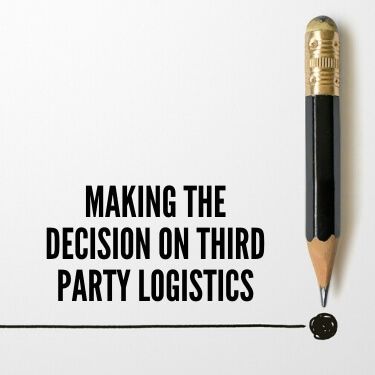
After a full rundown of the advantages and disadvantages of third party logistics, the decision of whether to hire a 3PL provider can still seem daunting. How do you decide what factors are most important to you?
If your business a rapidly growing startup, it’s highly recommend to look into a 3PL company. In this situation, your rate of production will likely outpace your ability to adjust your in-house logistics operations on the fly. Additionally, you will want to focus your energy and resources on continuing to scale the business. Let an experienced 3PL provider worry about keeping up with your blossoming success.
For some smaller businesses just starting out, it might be wise to be patient before tapping a 3PL provider. If you don’t have a strong idea of the volume you expect to be shipping and storing, outsourcing your logistics might be too big of a commitment. However, if you are a small but established business, there’s no reason that you can’t benefit from the stability, consistency and efficiency of third party logistics.
Additionally, if your business is looking to expand into new areas -- whether that means a new product or a regional market -- a 3PL provider could very likely be the way to go. You can seek out 3PL companies that have experience in handling whatever your new endeavor entails. Rather than taking it upon yourself to brush upon on new, minute details, hand if off to the experts.
Once you’ve decided to move forward with third party logistics, it’s time to find the best fit for your business. You need a 3PL provider that emphasizes prompt service, communication and peace of mind. R+L Global Logistics has the fulfillment and distribution solutions that you need to take your business to the next level.
Whether you need someone to handle warehousing, retail inventory management, kitting and assembly, or reverse logistics, R+L Global Logistics has the infrastructure, network, and team to get the job done. The company puts a focus on customer service, promising hands-on support and real-time visibility.
R+L Global Logistics knows the ins and outs of the best practices and procedures to manage your inventory. The company’s comprehensive range of services can be personalized to your company’s individualized needs. Get started today by reaching an R+L Global representative -- just call 866-989-30823 or use the chat feature.
